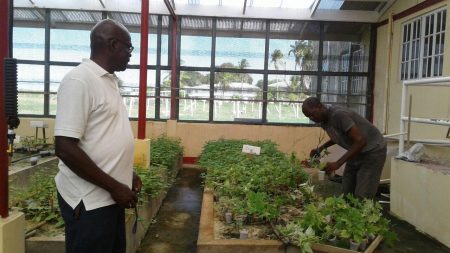Rayburn Jones is one of a community of farmers plying their trade at Mocha on the East Bank of Demerara without the sort of high-profile publicity usually associated with farming in some of Guyana’s more prominent agricultural communities. Jones, a father of four, has been a farmer for most of his life, planting, reaping and wholesaling in a cycle that may be more than a trifle monotonous…that however may be about to change.
His ambitious plan to, one day, create an enterprise that packages sweet potato chips for the domestic and regional markets may have begun to take shape with the support of the National Agricultural Research and Extension Institute. (NAREI).

The start that NAREI has offered Jones has come in the form of a gift of five hundred sweet potato slips. He intends to persist in selling sweet potato at the Mocha community market but has set the end of 2017 as a target for the beginning of his new enterprise. The venture will start as a kitchen operation and in its earliest stage the target market will be members of the Mocha community.
Named “Operation Success” the first phase of the project commenced with Jones receiving support under an agreement between the Caribbean Development Fund (CDF) and the Government of Guyana.
Under the wider project, the Ministry of Agriculture, NAREI, the Guyana Livestock Development Authority (GLDA) and the New Guyana Marketing Corporation (GMC) will collaborate to assist farmers at Ithaca, Buxton, Beterverwagting and Mocha to provide infrastructure, including drainage and irrigation, land clearing, soil testing and training.
It was in anticipation of being a beneficiary of the project that the 44-year old Jones sought the planting materials and made an approach to NAREI. “I approached NAREI for the sweet potato slips because I know they would not have the sweet potato weevil…I know I wouldn’t be taking back any pests to my farm to affect my crops…I know NAREI always has quality planting materials,” Jones said.
NAREI confirms that its experience has enabled it to acquire stocks of disease-free planting material including sweet potato chips. Sweet potato slips are produced using tissue culture technology. Samantha Brotherson, a Research Scientist, explained that sweet potato mother plants are collected from farmers and monitored in a greenhouse for about three to four weeks. Fungicide and insecticide are applied to the slips to eradicate fungus. Once the mother plants are cleaned, shoots are collected from them and taken to the laboratory where surface sterilization, using a fungicide dip, is applied for 30 minutes. The shoots are then washed in distilled water, rinsed in a solution comprising 70 % alcohol and afterwards rinsed twice in distilled water. The plants are then taken to a bio-safety cabinet where 20% sodium hypochlorite solutions are used in a rinsing process that lasts between fifteen and twenty minutes. Afterwards, they are rinsed thrice with sterilized water then left in the culture room at a temperature of 25 degree Celsius then in sixteen hours of darkness and eight hours of light. After the first month, a subculture is done and multiplication continues.
With the support of the CDF, Jones intends to expand the range of his crops to include cassava and turmeric. He has already prepared four acres of his ten-acre farm on which he will grow sweet potatoes and cassava simultaneously. Once the remaining six acres are cleared, he will be introducing the turmeric and other crops.
Commenting on the role of NAREI in the Project, NAREI Chief Executive Officer Dr. Oudho Homenauth said that the Institute plans to persist with soil sampling and analysis in order to determine the best crops to be grown as well as management practices needed to ensure efficient and bountiful production.
NAREI Extension officers have been permanently assigned to support these initiatives and to report their findings to the Institute.





